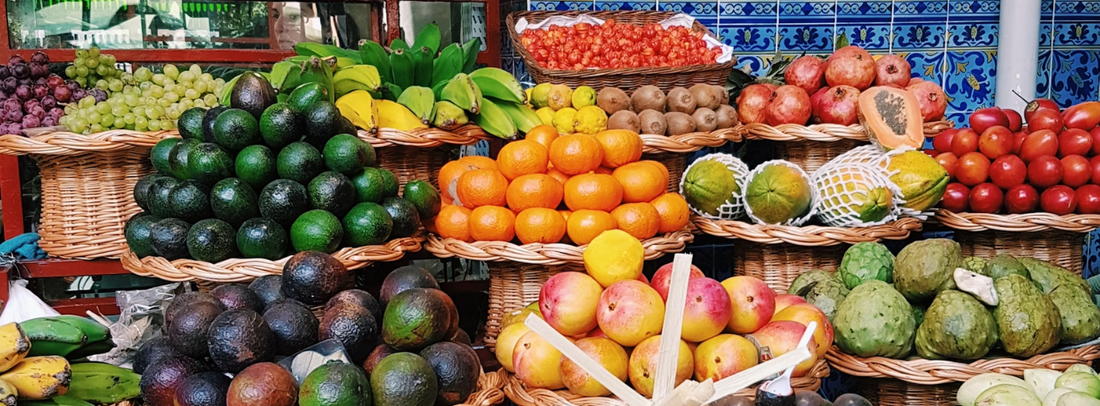Tropical fruits are renowned for their vibrant flavors, rich nutritional profiles, and exotic appeal. Beyond the commonly known varieties, a world of tropical delights awaits exploration. This article delves into ten essential tropical fruits, highlighting their unique characteristics, health benefits, and culinary applications in cuisine for restaurants.
Mango
Often dubbed the "king of tropical fruits," the mango is a beloved and widely popular fruit.
- Flavor Profile: Mangoes are renowned for their sweet, juicy, and slightly tangy taste, complemented by a rich, tropical aroma.
- Nutritional Value: Packed with vitamins A and C, fiber, and antioxidants, mangoes offer a wealth of health benefits.
- Uses: Ripe mangoes are delicious enjoyed on their own. They can also be incorporated into a variety of dishes, including smoothies, salsas, chutneys, and desserts. Mango puree is a natural sweetener for baked goods.

Pineapple
A tropical classic, the pineapple is a distinctive and refreshing fruit. Its iconic appearance, with a crown of spiky leaves atop a golden fruit, is instantly recognizable.
- Flavor Profile: Sweet and tangy with a tropical, refreshing taste.
- Nutrients: Rich in vitamin C, manganese, and bromelain, an enzyme that aids digestion.
- Uses: Enjoy fresh pineapple, pineapple juice, or grilled pineapple. It’s a versatile fruit that complements both sweet and savory dishes, from tropical cocktails to grilled meats.

Dragon Fruit
A visually striking fruit, the dragon fruit boasts a unique appearance with vibrant colors and textured skin.
- Flavor Profile: Mildly sweet and slightly floral, the dragon fruit offers a refreshing taste. The white flesh is typically sweeter than the red variety.
- Nutritional Value: This exotic fruit is packed with nutrients, including fiber, vitamin C, iron, and antioxidants, making it a healthy addition to your diet.
- Uses: Enjoy the dragon fruit fresh for its natural sweetness, or incorporate it into smoothies, yogurt, or as a colorful garnish.

Passion Fruit
A burst of tropical flavor, the passion fruit is a small but mighty fruit packed with intense taste.
- Flavor Profile: Renowned for its complex flavor profile, the passion fruit offers a tantalizing blend of sweet and tart notes.
- Nutritional Value: Beyond its delicious taste, the passion fruit is a nutritional powerhouse, rich in vitamin A, vitamin C, iron, and fiber.
- Uses: Commonly enjoyed as a refreshing juice, the passion fruit's versatility extends to cocktails, desserts, sauces, and marinades, adding a burst of tropical flavor.

Papaya
A tropical gem, the papaya offers a delightful combination of sweetness and creaminess.
- Flavor Profile: Sweet and slightly tangy, the papaya's flavor is complemented by its soft, creamy texture when ripe.
- Nutritional Value: Packed with vitamins A, C, and E, as well as fiber and digestive enzymes, the papaya is a nutrient-rich fruit.
- Uses: Enjoy the papaya ripe on its own, or incorporate it into salads, smoothies, or tropical fruit bowls. It can also add a unique flavor to chutneys and salsas.

Guava
A tropical fruit with a distinctive aroma, the guava offers a refreshing taste.
- Flavor Profile: Sweet and tangy with a tropical floral aroma, the guava provides a delightful flavor experience.
- Nutritional Value: This fruit is rich in vitamin C, fiber, and antioxidants, making it a healthy choice.
- Uses: Enjoy the guava fresh, or transform it into delicious juices, jams, jellies, or pastes. It can also be added to smoothies and desserts.

Lychee
Known for its delicate sweetness, the lychee is a tropical treat.
- Flavor Profile: Sweet, delicate, and floral with a subtle grape-like undertone, the lychee offers a refined taste.
- Nutritional Value: A good source of vitamin C and fiber, the lychee contributes to a balanced diet.
- Uses: Typically enjoyed fresh, the lychee can elevate cocktails, desserts, and fruit salads with its elegant flavor.

Coconut
A versatile tropical fruit, the coconut offers a range of culinary possibilities.
- Flavor Profile: Sweet, creamy, and with a subtle nutty undertone, coconut offers a distinct taste.
- Nutritional Value: Rich in healthy fats, fiber, and essential minerals like magnesium and potassium, coconut is a nutritious ingredient.
- Uses: From the refreshing coconut water to the creamy flesh and milk, the coconut is a culinary superstar. It's used in everything from tropical drinks to savory curries and decadent desserts.

Pomelo
A citrus fruit with a milder flavor, the pomelo is a refreshing and healthy choice.
- Flavor Profile: Sweet and slightly tart, similar to grapefruit but with a milder taste, the pomelo offers a balanced citrus experience.
- Nutritional Value: Packed with vitamin C, fiber, and lycopene, the pomelo is a nutrient-dense fruit.
- Uses: Enjoy the pomelo fresh, in salads, or as a juice. Its zest can also be used in marmalades and preserves.

Acai
A superfruit packed with antioxidants, acai has gained popularity for its health benefits.
- Flavor Profile: Acai berries have a slightly tart and earthy flavor, often described as similar to dark chocolate.
- Nutritional Value: Rich in antioxidants, fiber, and healthy fats, acai is considered a superfood.
- Uses: Commonly consumed as a smoothie or bowl, acai is often blended with other fruits and sweeteners to create a delicious and nutritious treat.

Conclusion
Tropical fruits offer restaurants a wealth of opportunities to create innovative and delicious menu items. From vibrant smoothies and refreshing juices to exotic desserts and savory dishes, these fruits can elevate any culinary experience. By incorporating a variety of tropical fruits, restaurants can cater to diverse palates and showcase their commitment to fresh, flavorful cuisine.







